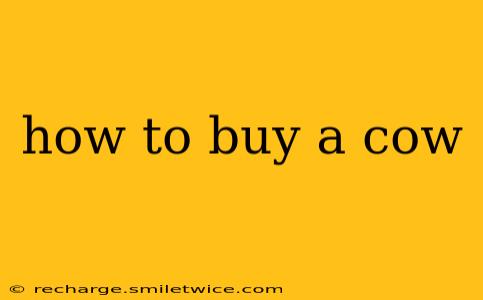Buying a cow can be a rewarding experience, whether you're starting a small farm, need a milk source, or simply want a unique pet. However, it requires careful planning and research. This comprehensive guide will walk you through the process, answering common questions and helping you make an informed decision.
What Kind of Cow Should I Buy?
This is the most crucial first step. The ideal breed for you will depend on your purpose. Do you need a cow for milk production (dairy cow), meat production (beef cow), or dual-purpose? Consider:
- Dairy Breeds: Holsteins, Jerseys, Brown Swiss, and Guernseys are popular choices, known for high milk yields. Research the milk production capabilities and temperament of each breed to find the best fit for your needs and experience level.
- Beef Breeds: Angus, Hereford, Charolais, and Limousin are some examples of beef cattle known for their meat quality and growth rates. Factor in the space and resources needed to raise a beef cow to maturity.
- Dual-Purpose Breeds: Some breeds, like Shorthorns and Milking Shorthorns, offer a balance of milk and meat production. These can be a good option if you want both milk and beef.
Consider the climate in your area and the hardiness of different breeds. Some breeds are better suited to hot climates, while others thrive in colder temperatures.
Where Can I Buy a Cow?
Several avenues exist for purchasing a cow:
- Local Farmers: This is often the best option. You can inspect the cow's health and environment firsthand and build a relationship with the seller. Attend local livestock auctions or contact farmers directly.
- Online Marketplaces: Websites and online auction sites specialize in livestock sales. However, thoroughly research sellers and be cautious of scams.
- Breed Associations: Breed-specific associations can connect you with breeders in your area. They often have strict standards and can provide guidance on selecting a healthy animal.
What Should I Look for in a Healthy Cow?
Before you buy, conduct a thorough inspection:
- Physical Condition: A healthy cow should be alert, have bright eyes, clean coat, and good body condition (not too thin or too fat).
- Teeth: Check the teeth to estimate the cow's age. Older cows may have worn teeth, which can impact their ability to eat properly.
- Udder (for dairy cows): The udder should be free from lumps, sores, and inflammation. Observe the teats for any damage.
- Movement: The cow should move freely and without limping.
- Veterinary Check: Ideally, have a veterinarian examine the cow before purchasing to ensure it's healthy and free from diseases.
How Much Does a Cow Cost?
The cost of a cow varies significantly based on breed, age, health, and location. Prices can range from a few hundred dollars for a young, less productive animal to several thousand dollars for a high-producing dairy cow or a registered breeding animal. Factor in additional costs, including transportation, feed, veterinary care, and housing.
What Are the Ongoing Costs of Owning a Cow?
Owning a cow is not just a one-time expense. You'll need to budget for:
- Feed: Hay, grain, and supplements are essential for maintaining a cow's health and productivity.
- Veterinary Care: Routine checkups, vaccinations, and treatment for illnesses are crucial.
- Housing: You'll need a suitable shelter to protect the cow from the elements.
- Land: Adequate pasture or grazing land is necessary, especially for beef cows.
What About Legal Considerations?
Be sure to understand any local regulations regarding livestock ownership. These may include zoning laws, permits, and animal health requirements. It’s wise to consult with local authorities before bringing a cow home.
Can I Buy a Cow Without Experience?
While it's possible, buying a cow without experience can be challenging. Consider starting with a less demanding breed or seeking guidance from experienced farmers. Proper training and knowledge are essential for ensuring the cow's health and well-being. Don't hesitate to reach out to your local agricultural extension office for advice and resources.
This guide provides a solid foundation for buying a cow. Remember, thorough research, careful planning, and a realistic assessment of your capabilities are key to a successful experience. Good luck with your new bovine companion!
